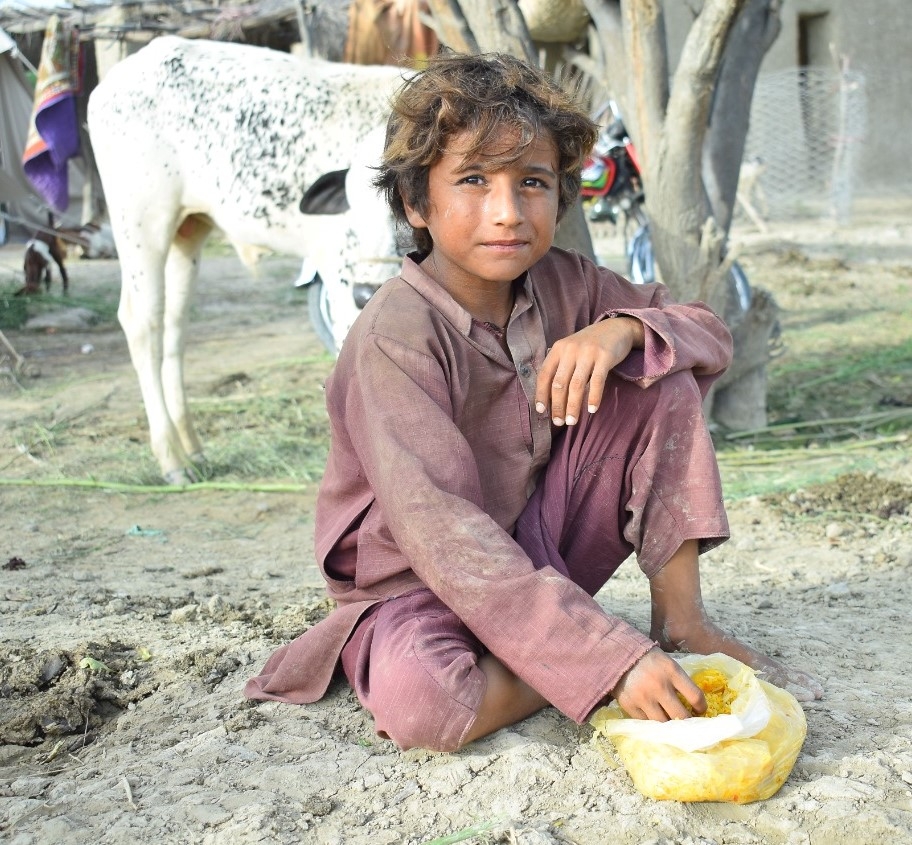After catastrophic floods hit Pakistan, these local leaders are forging their future.
A young boy sat on the ground in Pakistan’s Balochistan province. It was a miraculous dry spot with one-third of the country’s land under water. One hand reached for the rice in front of him, served in a plastic bag.
“We do not have the luxury to distribute food on plates,” Sarah Ahmed explained.
She works with Al-Mustafa Welfare Society, a local nonprofit that connected emergency relief staff with cooks across flooded areas of Pakistan. They made rice or biryani in bulk for the boy in Balochistan and nearly a million others who needed food as the floodwaters rose and washed away homes.
“We can do whatever we can with limited resources, and we try to reach as many people as we can,” Sarah said.

A boy in Pakistan’s Balochistan province receives food distributed by Al-Mustafa Welfare Society’s disaster recovery team.
Photo: Al-Mustafa Welfare Society
Making sure the boy in Balochistan and millions of other survivors had food to eat—that was the early days of the response to the Pakistan floods. More than eight months have passed since then—since people climbed trees or onto trucks just to stay safe. Millions needed medicine, shelter, and sanitation. And that says nothing of their livelihoods, like land and livestock, that were swallowed up by the rising waters.
Ultimately, 33 million people were affected by the floods that started with historic heavy rainfall last June. More than 1,700 people died. Two million homes were damaged or destroyed.
“And it’s not just about houses—the roads, the bridges, and local economies are totally crippled,” Sarah said.
More than 10 million people in flood-hit areas still don’t have safe drinking water. Restoring basic rights and rebuilding lives will take even longer than it did for the floodwaters to recede. Pakistanis are grappling with these effects, economic shocks, a displacement crisis, and dwindling aid.
But the media, and the world, have largely moved on.
For Alia, it’s not so easy to forget.
She lost her husband, Habib, who was a fisherman, to the floods.
Alia and her three children survived, but the house they shared and the stability they had are gone.
“The deluge submerged us in the grave psychologically,” Alia said.
With so much lost, FACES Pakistan, another locally based nonprofit, helped Alia and her children reconstruct their house. And the work to support them—and prepare them for a future with increasing climate risk—goes on.
Support people in need after the Pakistan floods.
Pakistan is responsible for emitting less than 1 percent of the greenhouse gasses that are accelerating the climate crisis. Yet, Pakistan is one of the most vulnerable countries in the world in terms of impacts from extreme weather events, according to the Global Climate Risk Index.
At the latest COP27 climate conference, Pakistan’s Prime Minister Shehbaz Sharif spoke about the catastrophic floods and the $30 billion cost of damages.
“We have mobilized every available resource toward the national relief effort,” but it is not enough, the Prime Minister said.
Representatives from Pakistan and other nations on the front lines of the climate crisis pushed for a loss and damage fund. It’s intended to help address the impacts of events like last year’s floods and the crises that continue because of the changing climate.
Already, disasters across the world are becoming the worst in living memory.
“People 70 years old have never seen a disaster this bad,” Sarah of Al-Mustafa Welfare Society said of the 2022 Pakistan floods.
When they saw the water inundate the country, it looked more like a tsunami than a flood. “The ocean is coming,” they said.
With support from GlobalGiving’s Pakistan Flood Relief Fund, organizations like Al-Mustafa Welfare Society are staying—no matter what comes. They’re committed to providing years-long relief and preparing their communities for the inevitable disasters they’ll face.
“We need to help our people and each other,” Sarah said. “It’s not just about Pakistan.”
It’s not just about the frontline countries feeling the worst effects of rising seas, extreme storms, or devastating drought.
“The world is a global village if we accept it or not,” Sarah said. “We are in this together.”
Support people in need after the Pakistan floods.
Featured Photo: Pakistan Floods Emergency Appeal by Akhuwat USAFind exactly what you're looking for in our Learn Library by searching for specific words or phrases related to the content you need.